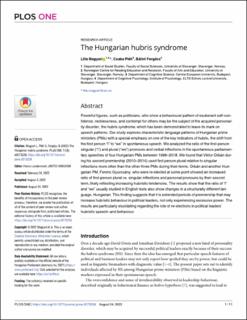| dc.contributor.author | Magyari, Lilla | |
| dc.contributor.author | Pleh, Csaba | |
| dc.contributor.author | Forgács, Bálint | |
| dc.coverage.spatial | Hungary | en_US |
| dc.date.accessioned | 2022-09-01T11:40:18Z | |
| dc.date.available | 2022-09-01T11:40:18Z | |
| dc.date.created | 2022-08-30T13:43:03Z | |
| dc.date.issued | 2022-08 | |
| dc.identifier.citation | Magyari, L. Pléh, C., Forgács, B. (2022) The Hungarian hubris syndrome. PLoS One, 17(8) | en_US |
| dc.identifier.issn | 1932-6203 | |
| dc.identifier.uri | https://hdl.handle.net/11250/3015127 | |
| dc.description.abstract | Powerful figures, such as politicians, who show a behavioural pattern of exuberant self-confidence, recklessness, and contempt for others may be the subject of the acquired personality disorder, the hubris syndrome, which has been demonstrated to leave its mark on speech patterns. Our study explores characteristic language patterns of Hungarian prime ministers (PMs) with a special emphasis on one of the key indicators of hubris, the shift from the first person “I” to “we” in spontaneous speech. We analyzed the ratio of the first-person singular (“I”) and plural (“we”) pronouns and verbal inflections in the spontaneous parliamentary speeches of four Hungarian PMs between 1998–2018. We found that Viktor Orbán during his second premiership (2010–2014) used first person plural relative to singular inflections more often than the other three PMs during their terms. Orbán and another Hungarian PM, Ferenc Gyurcsány, who were re-elected at some point showed an increased ratio of first-person plural vs. singular inflections and personal pronouns by their second term, likely reflecting increasing hubristic tendencies. The results show that the ratio of “I” and “we” usually studied in English texts also show changes in a structurally different language, Hungarian. This finding suggests that it is extended periods of premiership that may increase hubristic behaviour in political leaders, not only experiencing excessive power. The results are particularly elucidating regarding the role of re-elections in political leaders’ hubristic speech–and behaviour. | en_US |
| dc.language.iso | eng | en_US |
| dc.publisher | Public Library of Science (PLoS) | en_US |
| dc.rights | Navngivelse 4.0 Internasjonal | * |
| dc.rights.uri | http://creativecommons.org/licenses/by/4.0/deed.no | * |
| dc.subject | hubris-syndrom | en_US |
| dc.subject | Ungarn | en_US |
| dc.subject | politikere | en_US |
| dc.title | The Hungarian hubris syndrome | en_US |
| dc.type | Peer reviewed | en_US |
| dc.type | Journal article | en_US |
| dc.description.version | publishedVersion | en_US |
| dc.rights.holder | © 2022 Magyari et al. | en_US |
| dc.subject.nsi | VDP::Samfunnsvitenskap: 200::Psykologi: 260 | en_US |
| dc.source.volume | 17 | en_US |
| dc.source.journal | PLOS ONE | en_US |
| dc.source.issue | 8 | en_US |
| dc.identifier.doi | 10.1371/journal.pone.0273226 | |
| dc.identifier.cristin | 2047223 | |
| cristin.ispublished | true | |
| cristin.fulltext | postprint | |
| cristin.fulltext | original | |
| cristin.qualitycode | 1 | |

